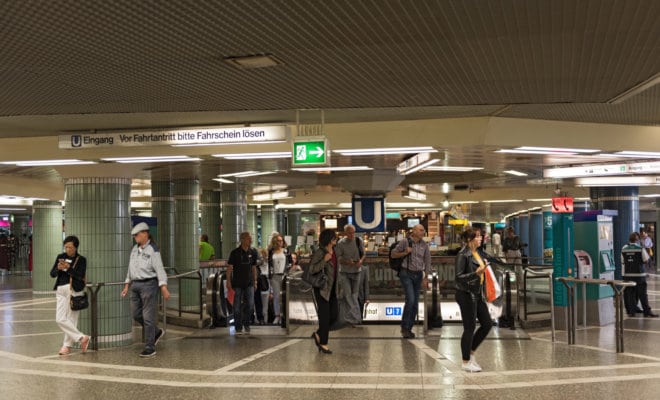Immigration
Most Native Germans Positive About Immigrants: Study

Passengers at Hauptwache subway station, Frankfurt on Main, Germany.
Photo: Bigstock
A majority of German citizens are happy to live with their immigrant neighbors, according to the "Integration Barometer 2018" report published by the Expert Council of German Foundations on Integration and Migration.
Most Germans view their immigrant neighbors positively and have no problems living with them, a new study has found. The study noted an East-West split, as well as a divide on headscarves in the country.
Germans continue to view the country’s multicultural society positively, according to the study published by the Expert Council of German Foundations on Integration and Migration (SVR).
The “Integration Barometer 2018” is the first representative study on the matter to come out since the start of the so-called refugee crisis in 2015, which saw hundreds of thousands of people escaping war and poverty in their home countries in West Asia and enter Europe, German broadcaster Deutsche Welle said in a report on its website.
Despite refugees and immigration policy dominating the news and politicians’ speaking points in Germany, most people still think it’s business as usual with their immigrant or non-immigrant neighbors, the report said.
According to the study, about 63.8 percent of local Germans — people without an immigrant background — view the integration situation positively, down marginally from the 65.4 percent reported in 2015. People with immigrant background viewed the integration situation even more positively at 68.9 percent. However, there is a West Vs. East divide when it comes to immigrants, with 66 percent of western Germans expressing satisfaction with the level of immigration, while eastern Germans rated it at 55 percent. The study found that areas where fewer migrants live, such as in the eastern German states, showed more people with reservations about immigration and integration, the report added.
Men viewed the status of integration in Germany more negatively than women, it said.
Skepticism about immigrants can be overcome by having more “personal encounters,” researchers said. “The everyday experiences are significantly better than what the [media] discourse would suggest,” they wrote in the study, according to the report.
The study’s results were “a good sign,” Annette Widmann-Mauz, Germany’s integration commissioner, told the broadcaster, adding that it’s important to support schools and other places where people have more opportunities to come into contact with their neighbors. Attitudes about integration are most positive “wherever there are direct contacts in the neighborhoods, among friends or at work,” she told Deutsche Welle.
The study said that German citizens’ attitudes toward refugees were largely positive and around 60 percent of local Germans said they were okay if refugees continued to enter their country. However, a majority of them also want to curb the number of refugee arrivals, the broadcaster said in its report.
There are about 161,000 people of Indian background in Germany, including Indian expatriates as well as German citizens of Indian descent. Lately, Germany has become a top destination for Indian professionals and students.
The number of qualified professionals from India in Germany is increasing, with a large percentage of blue card holders in the country now coming from India. In the first half of 2016, the top five nationalities that received the European Union (EU) blue cards were India with 22.1 per cent, followed by China (8.7 per cent), the Russian Federation (7.9 per cent), Ukraine (5.3 per cent) and Syria (4.7 per cent), according to the German Federal Office for Migration and Refugees (BAMF).
The country has also emerged as one of the top destinations for Indian students pursuing courses abroad. The United States was the most preferred destination for university while Australia and the United Kingdom followed, ahead of Canada and Germany, according to the report titled “Value of Education, Higher and Higher” based on a survey by HSBC bank last year.



